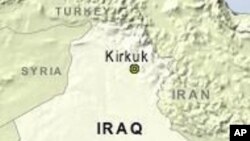Iraq's parliament again has failed to agree on a new electoral law for the January parliamentary election, raising fears that the vote may have to be delayed.
The United Nations special envoy to Iraq, Ad Melkert, warned on Wednesday that further delays could undermine both the date and the credibility of the election.
Lawmakers again failed to vote on the agreement Wednesday. The delay stems from a dispute about how to hold the poll in oil-rich Kirkuk, an ethnically-mixed province in northern Iraq with Kurdish, Arab and Turkmen populations.
The deadlock prompted parliament to hand over the issue to a senior political council for mediation. Iraq's president and prime minister, among others, sit on that council, the Political Council for National Security.
Lawmakers said they will meet next week, Monday, to hold the often-postponed vote, if a draft is ready by Sunday.
Elections are set for January 16.
Iraqi Prime Minister Nouri al-Maliki met with U.S. President Barack Obama in Washington Tuesday, and both leaders emphasized the importance of holding Iraqi elections on time.
Iraq last held parliamentary elections in 2005.
Iraqi lawmakers also have not decided whether to implement a closed or open voting system.
An open system requires parties to disclose the names of the individuals who would take up seats in parliament. A closed voting system includes only the names of parties and not individual candidates.
The United Nations spent more than one year working on a report about reducing ethnic tensions and resolving territorial disputes in areas such as Kirkuk. That report, presented in April, provided more analysis than firm guidelines.
The U.N. report included outlines of four possible options for the future of Kirkuk province. It said all of the options were developed with the Iraqi constitution in mind, and all the proposals required a political agreement and some form of a referendum.
Some information for this report was provided by AFP, AP and Reuters.




